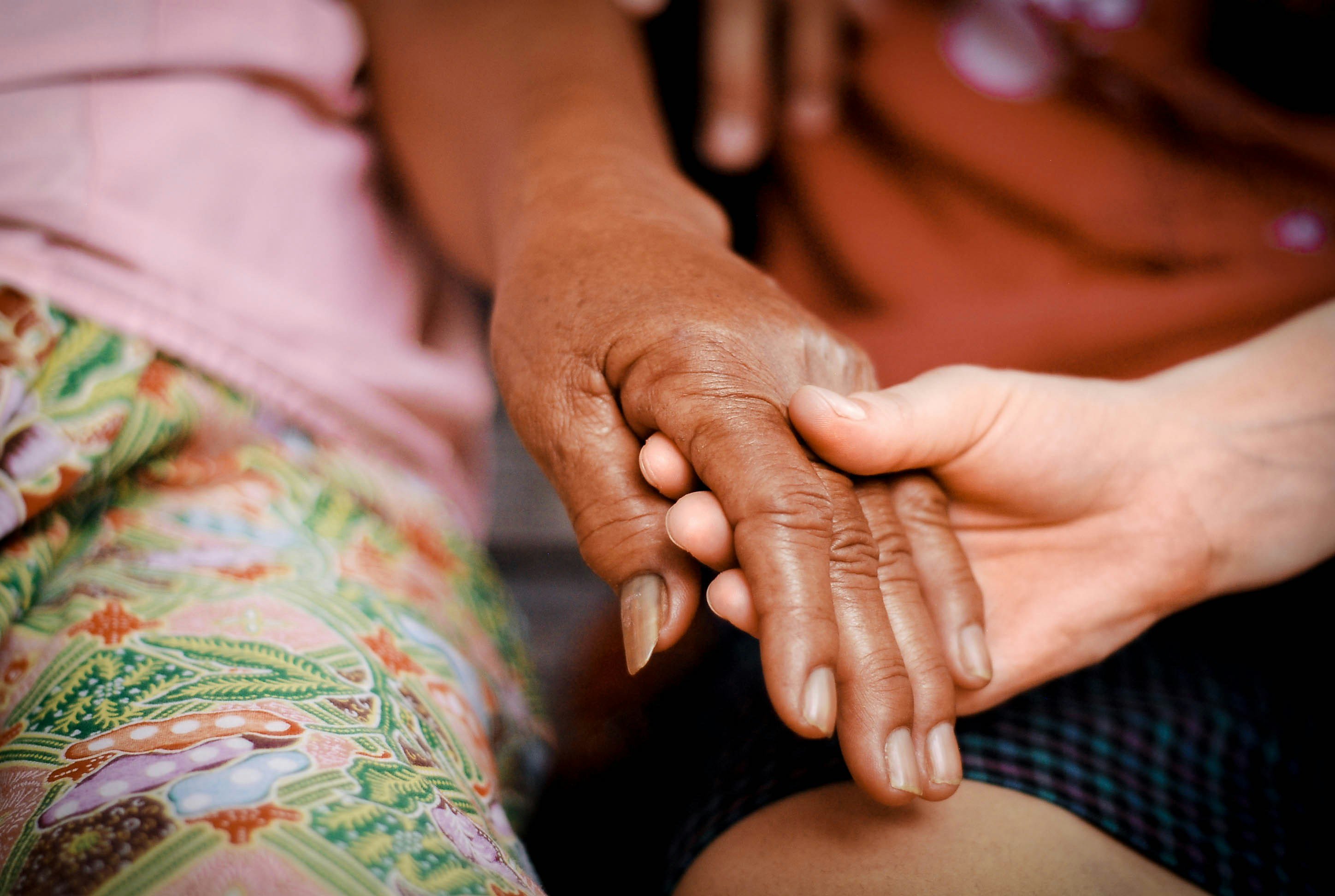When you picture a “beauty influencer,” you probably don’t imagine a balding, bearded, bespectacled retired psychology professor surrounded by piles of papers. But I would put Dr. Rhett Diessner up against any TikTok creator on Earth when it comes to beauty, as he’s spent over two decades deeply studying the subject and has a profound understanding of how it influences us.
Around 1998, while teaching at a small international university in Switzerland, Diessner had an epiphany. As he explored the villages, lakes and mountains in the area, he found himself enamored with the picturesque landscapes, soaring cathedrals, incredible art and soul-stirring ideas that surrounded him. In moments of meditation, he began to see appreciation of beauty as more than just an enjoyable pastime.
“It dawned on me that beauty has spiritual roots,” Diessner tells Upworthy. “That it’s really a foundational aspect of being human, a very important aspect of our soul.” Searching religious scripture confirmed this idea, and he decided he would focus his academic research on the human trait of attraction to beauty.
We know beauty when we see it—or perhaps we know it when we feel it—but how do we define it? What exactly is beauty? What are the qualities that make something beautiful?
Diessner chuckles at this question. “Notable philosopher of beauty in America Crispin Sartwell says beauty is famous as a concept that not only should not be defined, but perhaps cannot be defined,” he says. “But then, of course, I go ahead and define it.”
Beauty exists in three places, Diessner explains. It’s in our mind as the beholder when we perceive something as beautiful, it’s in the object we’re beholding as it provides a stimulus for our brain, and it’s in the interaction between the two.
“At the same time, we want to know what these things that we find beautiful have in common. And this is where it gets pretty cool,” Diessner says. “Most of the world’s most famous philosophers, starting with Plato and Aristotle, say that what everything beautiful has in common is unity in diversity. They have different phrases for it—they might call it unity in variety—but basically it boils down to the concept that when we see a variety of elements organized and unified, this almost always appeals to our mind as something beautiful.”

Diessner has focused his studies on four categories of beauty:
Natural beauty: The beauty of nature. Humans are attracted to sunsets, mountains, the ocean, flowers, the patterns on a butterfly’s wings, etc. The beauty of the natural world is recognized universally. “Even in towns and cities, we see it in the green spaces. We hear it in the birds next to our house,” Diessner points out.
Artistic beauty: Human-made beauty. Art, architecture, dance, theater, music—all the beautiful things people create. Diessner explains that even the make-up tricks “beauty influencers” demonstrate while supporting the billion-dollar beauty industry have their roots in artistic beauty. “Applying paints and textures to our face and body—we’ve been doing this as long back as thousands and thousands of years, and there’s clearly some artistic skill involved,” he says.
Moral beauty: Also known as “inner beauty,” this is the beauty we see when a person displays virtuous qualities—kindness, compassion, altruism, honesty, caring. “When people are in difficult circumstances and have hope, when somebody stands up for social justice when other people are oppressed, when somebody opens their heart with love for people that might be difficult to love. We’re like, ‘Whoa, that’s beautiful,’” says Diessner.
Beautiful ideas: “Peace on Earth and goodwill toward men” is a beautiful idea. Philosophical, religious, spiritual concepts can be beautiful. For mathematicians, even certain math equations are seen as beautiful. “Einstein is recorded as saying that the beauty of an equation was more important to him than whether it actually corresponded with physical reality,” Diessner shares.
Some of our attraction to beauty can be explained by evolutionary psychology. As Diessner explains, we are at least partially attracted to water and greenery in nature because they mean food and hydration, without which we wouldn’t survive or reproduce. We are attracted to vistas and sweeping landscapes because being up high meant safety and the ability to see predators coming as well as being able to find food and water sources more easily.
Some of what appeals to our attraction to beauty trait is also culturally influenced. This is particularly true of artistic beauty, but moral beauty can also be appreciated differently by people based on what is valued the most in their culture. However, people are universally attracted to these four kinds of beauty, even if their individual preferences within those categories differ.

Is one kind of beauty more important than the others? Not necessarily, but Diessner does refer to moral beauty the “big prize.” He cites a not-yet-published study from Berkeley’s Dacher Keltner—”the world’s greatest researcher on awe” according to Diessner—in which researchers asked 100 people from all over the world what makes them feel awe. The top answer was moral beauty—a result that surprised Keltner and Diessner alike.
“He expected, just like I did, for it to be natural beauty—’Oh that mountain!’—but no, the number one cause of awe cross-culturally is seeing people’s virtues in action,” says Diessner.
The problem in the modern age is that is when you search for “beauty” on Google, social media, or stock photo sites, all you see are beauty product ads and tutorials. So where where does all of that fit into this picture?
Diessner says there is power in being seen as physically beautiful. “Physical looks give you a higher income at your job. They help get you the job,” he says. “There’s a lot of research that shows that people actually judge physically beautiful people as more morally good. That’s been found over and over and in multiple countries.”
However, he points out, “the reverse is also true. The more we notice somebody’s inner beauty the more physically beautiful we start to think they are. Isn’t that great?”
Not only does beauty have the power to transform our minds to see things differently, but Diessner’s research shows that engagement with these four types of beauty might actually help change the world. In fact, one study he led found that the appreciation of beauty trait predicted pro-environmental behavior and moral elevation—caring for the planet and striving to be better people—better than 23 other character strengths did, lending support to the idea that broadening how we think of and engage with beauty is far more important than we might think.
“When we put everything in the physical beauty bag, we often, at some point, feel like we don’t have anything,” Diessner says. “Whereas being engaged with natural beauty, artistic beauty or especially the beauty of virtues, we build up a lot of inner resources.”
“We live our entire life in only one place, and that’s our mind,” he explains. “We think we’re touching stuff and smelling stuff, but all that’s happening inside our mind. It’s the only place we’re ever going to be, and when you engage with beauty, you make your mind a more beautiful place to be. The research also shows that the more beautiful our mind is the more likely we are to serve others, the more likely we are to engage in prosocial behavior, the more likely we are to start thinking of the common good and not our own little selfish desires. This is really one of the most powerful things about beauty.”
Finally, Diessner says that a person’s appreciation of beauty trait can be enhanced, like improving a skill, both with practice and by seeing engagement with beauty being modeled by others.
So what if we reimagined what “beauty influencer” meant based on Diessner’s research? What if a “model” was someone who showcased the beauty of engaging with nature, art, virtue or beautiful ideas? What if we encouraged people to hone their appreciation of beauty trait in service to humanity and created more opportunities for engaging with beauty? What if we celebrated beauty more in our interactions with each other and viewed it not as a superfluous extra in life but as a genuine necessity for us to collectively thrive?
Diessner’s conclusion after over 20 years of research is that human appreciation of beauty can actually help save the world. That definitely seems like a “beauty tutorial” series worth creating and sharing.
You can watch Rhett Diessner’s TEDx Talk, “The Psychology of Beauty and Love,” here.







































